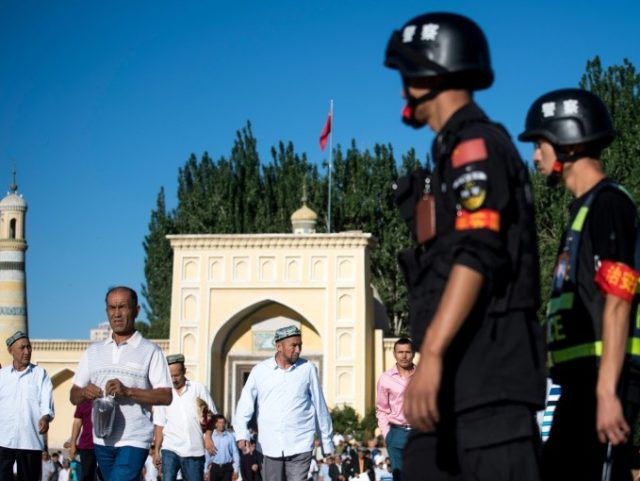A bipartisan group of lawmakers in the House and Senate introduced simultaneous bills on Wednesday seeking to condemn and punish the Chinese communist regime for establishing internment camps to torture and subdue the nation’s Muslim Uighur minority, urging sanctions against the officials running the camp experiment.
Human rights agencies and reports by the U.S. State Department have revealed in the past two years that Beijing has established dozens of internment camps for Uighurs and other Muslim ethnic minorities, such as Kazakhs, living in the nation’s westernmost Xinjiang province. Those forced into the camps suffer torture and abuse at the hands of government agents, reportedly forced to memorize communist propaganda songs, learn Mandarin, and pledge allegiance to Xi Jinping personally. Chinese officials claim the camps are “vocational centers” providing underprivileged minorities an education.
The bills introduced – both titled the “Uyghur Human Rights Policy Act of 2018” – urge the U.S. government to seek Global Magnitsky Act sanctions against Communist Party leaders in charge of the camps and urge the State Department to establish a special position for a Uighur rights expert to examine the human rights situation in Xinjiang.
Reps. Chris Smith (R-NJ) and Thomas Suozzi (D-NY) are introducing the bill in the House, while Sens. Marco Rubio (R-FL) and Bob Menendez (D-NJ) are introducing it in the Senate.
“These type of abuses are happening to the Uyghurs and other Muslims in China and it is appalling, over one million interned in camps without charges; children taken from interned parents and considered orphans; forced renunciation of faith; torture and mistreatment,” Rep. Smith told Breitbart News. “The ‘reeducation camps’ have become concentration camps which do not have a place in the 21stcentury. Chinese government officials should be held accountable for their complicity in this evil, and US businesses should be barred—for security and human rights reasons—from helping China build a high-tech police state in Xinjiang province.”
The Global Magnitsky Act grants the executive branch the power to sanction individuals with positions in foreign governments for engaging in human rights violations. Among potential sanctions are revocation of visas into the United States and banning American individuals and corporations from doing business with the targeted persons.
The Uyghur Human Rights Policy Act suggests the State Department should:
impose targeted sanctions on members of the Government of the People’s Republic of China, the Chinese Communist Party, and state security apparatus, including Xinjiang Party Secretary Chen Quanguo and other officials credibly alleged to be responsible for human rights abuses in Xinjiang and elsewhere.
Chen is believed to be the head of the internment camp system. Prior to his appointment to Party Secretary in Xinjiang, Chen served in Tibet, where he was responsible for establishing an elaborate surveillance and oppression system to monitor the activities of Tibetan Buddhist separatists. Having successfully imposed the new surveillance system, Beijing officials brought him to Xinjiang to replicate the project on the Uighur population.
China has dramatically increased the persecution of religious minorities under Communist Party leader Xi Jinping. While the internment camps are currently believed to only house Muslims, Xi’s government imposed heavy surveillance in Tibet and has also launched a national crackdown on Christianity, which is less associated with any one minority ethnic group than Buddhism or Islam in China.
“The Uyghur issue is one of the world’s worst human rights situations, including efforts to severely restrict Islam and to equate religious faith with terrorism and extremism. But China under Xi Jinping is an equal opportunity abuser of religious freedom,” Rep. Smith told Breitbart News. ” The religious freedom situation overall has deteriorated in China, including for Christians.”
In a press statement, Sen. Menendez described the situation in Xinjiang as “beyond abhorrent,” arguing it “shines a light of China’s surveillance state tactics that threaten basic human dignity.”
The Trump administration has been on the forefront of highlighting the abuse of Uighurs in Xinjiang through its State Department, which published an extensive report on abuses there in April. That month, Acting Deputy Assistant Secretary of State Laura Stone told reporters that the Trump administration was considering sanctions on Chinese Communist Party officials over the matter.
According to the State Department report and testimony from Uighurs who have survived the camps, Beijing has interned at least one million people in Xinjiang in 44 known camps in the state. The prisoners are forced to eat pork to make them less Muslim and memorize communist party songs or face physical and psychological torture, including food and sleep deprivation, being forced to spend hours frozen in uncomfortable crouching positions, or beaten by police.
The crackdown has triggered a wave of migrants to flee across Xinjiang’s border with Afghanistan. This week, Chinese authorities announced they would deploy thousands of soldiers in a “border patrol” effort to the region to keep Uighurs from fleeing.
Chinese Foreign Ministry spokeswoman Hua Chunying responded to the bills in her regular press briefing on Wednesday.
“It is really a wonder to me that these lawmakers think they are so superior that they can point fingers at other countries’ domestic affairs,” she asserted. “How much do they know about the real situation in other countries? And how much do they know about the situation inside their own?”
“They are spending their taxpayers’ money, but instead of focusing on serving their people, they always choose to ignore myriad problems facing their own country and are too obsessed with poking their noses in the domestic affairs of others,” Hua complained, launching into a speech about alleged racial discrimination in the United States.

COMMENTS
Please let us know if you're having issues with commenting.